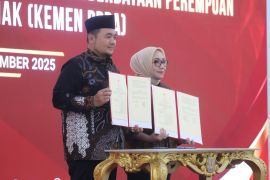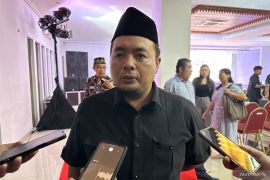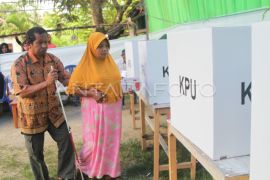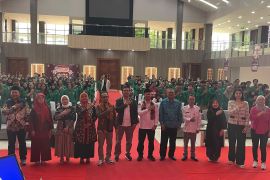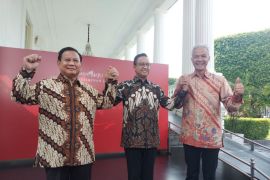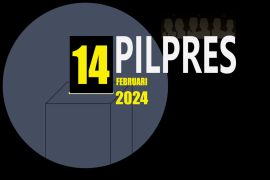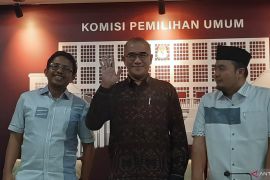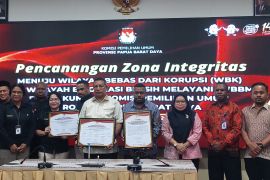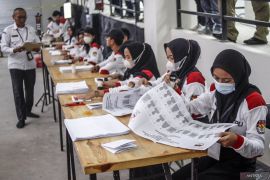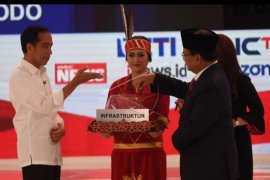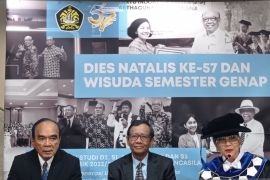Indonesia will also reap a demographic dividend in 2045, when the proportion of its working-age population (people aged 15–64) will be higher than the non-working-age population (those aged under 15 and above 65)
If the demographic bonus is not utilized properly, it could have a negative impact and give rise to social problems, such as poverty, poor public health, unemployment, and a high crime rate. However, if utilized well, it could become an important capital to achieve the Golden Indonesia vision.
The National Development Planning Ministry has devised the 2025–2045 National Long-Term Development Plan (RPJPN) to support the Golden Indonesia 2045 vision, which seeks to build a "Sovereign, Advanced, and Sustainable Nusantara Country."
The vision comprises four pillars: human development and mastery of science and technology, sustainable economic development, equitable development, and strong national resilience and governance.
The three pairs of presidential and vice presidential candidates contesting the 2024 election have incorporated the Golden Indonesia vision, which covers a variety of issues ranging from the demographic dividend to unemployment, into their vision and mission statements.
As part of steps for the 2024 election preparation, on Tuesday evening, the General Elections Commission (KPU) assigned serial numbers to the three presidential-vice presidential candidate pairs.
"The official numbers for the presidential-vice presidential candidate pairs for the 2024 elections are as follows: number one for the candidate pair Anies Baswedan-Muhaimin Iskandar, number two for the candidate pair Prabowo Subianto-Gibran Rakabuming Raka, and number three for the candidate pair Ganjar Pranowo-Mahfud MD," chairperson of the KPU, Hasyim Asy'ari, informed.
Anies Baswedan-Muhaimin Iskandar
The Baswedan-Iskandar pair, also known as AMIN, has shared a vision of building "A Just and Prosperous Indonesia for All." Their mission statement is entitled "Eight Ways of Change."
The Golden Indonesia 2045 goal is included in the opening paragraph of AMIN's vision and mission document, which envisages a developed, independent, united, sovereign, just, and prosperous country.
According to Baswedan and Iskandar, to make the most of the demographic dividend, Indonesia must seriously invest in improving education quality and access. Science laboratories, workshops, and libraries must be built in all schools where they are needed. Research budgets and competitiveness need to be increased, and the competence and welfare of teachers and education staff must be improved.
The titles of some sections in the opening of AMIN's vision and mission document touch on poverty, unemployment, and inequality. The document emphasizes that the state must mitigate social inequality to prevent conflict between classes.
Baswedan and Iskandar are of the view that Indonesia needs to usher in changes because the inadequate quality of human resources, poverty, unemployment, and climate crisis are the main problems that the nation must resolve to realize the "One Indonesia One Prosperity" goal before the country marks the 100th anniversary of its independence.
Under mission 1 of the "Eight Ways of Change," namely ensuring the availability of basic needs and low living costs through food self-sufficiency, energy security, and water sovereignty, the demographic dividend will be utilized to achieve food self-sufficiency by distributing productive workers and increasing food production.
Meanwhile, the second mission focuses on the issues of poverty alleviation and the creation of quality jobs. It specifically covers alleviating poverty by expanding business opportunities and creating jobs, achieving fair wages, guaranteeing economic progress based on independence and equity, and supporting Indonesian corporations to reach success in the country and grow on the global stage.
To reduce the unemployment rate, the AMIN pair aims to create quality jobs in all sectors, including the manufacturing industry, as well as provide capital support to young entrepreneurs.
Prabowo Subianto-Gibran Rakabuming Raka
Subianto and Raka have explicitly incorporated the Golden Indonesia goal in their vision: "Together With Onward Indonesia, Towards Golden Indonesia 2045." Their mission document is entitled "Eight Missions of Asta Cita."
In their vision and mission document, the pair have underlined that sustained economic growth of 6 to 7 percent will be necessary starting from 2025 to achieve the Golden Indonesia goal. This growth will need to be supported by the strengthening of the role of the government in the economy and the nation's development, in accordance with the Pancasila economy philosophy.
If Subianto and Raka are elected as president and vice president, they will seek to lay the foundation for a Golden Indonesia through the "8 Fast Best Result Programs" in five years through key programs, such as providing free lunch and milk in schools and Islamic boarding schools as well as nutritional assistance for under-five children and pregnant women.
The programs also cover providing free health checkups, reducing TB cases by 50 percent in five years, and building quality hospitals in districts; creating and improving the productivity of agricultural lands through village, regional, and national food estates; building integrated excellent schools in every district and renovating schools.
They further include continuing and expanding card-based social welfare assistance programs as well as card-based business assistance programs to eliminate absolute poverty; and increasing the salaries of civil servants (especially teachers, lecturers, and health workers), officers of the Indonesian Military (TNI) and the National Police (Polri), and state officials.
The programs also cover the continued development of village infrastructure and provision of cash assistance and cheap housing with good sanitation for those in need, as well as establishing a State Revenue Agency and increasing the ratio of state revenues to gross domestic product (GDP) to 23 percent.
The pair is also aiming to strengthen institutions and increase the population, family planning, and family development (KKBPK) budgets to boost the resilience of Indonesian families and ensure that people benefit from the demographic dividend. At the same time, they will look to create as many job opportunities as possible by prioritizing local workers to reduce the national unemployment rate.
Ganjar Pranowo-Mahfud MD
Pranowo and Mahfud's vision is "Towards an Excellent Indonesia: Moving Quickly to Realize an Equitable and Sustainable Maritime Country" and their mission statement is entitled "Eight Quick Moves."
The use of "Excellent Indonesia" instead of "Golden Indonesia" in their vision document indicates an intention to script a more concrete achievement and not assume other things are unmoving.
The idea of "Excellent Indonesia" incorporates the aim of making Indonesia not just a developed, strong, and competitive country, but also ensuring that the nation's progress, strength, and competitiveness are above and beyond that of other countries.
Meanwhile, the use of "Quick Moves" in the mission statement signifies an emphasis on stepping up efforts to make Indonesia an excellent country. Such an acceleration would be based on exploiting the demographic window, which will end soon.
According to Pranowo and Mahfud, the demographic dividend presents a challenge that will need to be resolved by improving the quality of human resources and gaining mastery of science and technology to prevent a demographic disaster.
The "Eight Quick Moves" missions are described as essential to ensure that the demographic dividend is utilized to pave the way for an "excellent" Indonesia.
Under mission number 2, namely "accelerating the mastery of science and technology through the acceleration of independent research and innovation," the pair is aiming to improve and expand massive and targeted scholarships for young Indonesians, in line with development strategies toward realizing a Golden Indonesia.
Meanwhile, under mission number 3, namely "accelerating independent economic development based on knowledge and added value," they aim to create 17 million new jobs. This is to ensure the absorption of the new workforce every year and reduce the unemployment rate until labor absorption reaches an optimal level so that everyone can get a job quickly.
Related news: Top leader candidates' views on equitable economy, poverty alleviation
Related news: 2024 election: Baswedan draws number 1, Subianto 2, Pranowo 3
Editor: Rahmad Nasution
Copyright © ANTARA 2023

